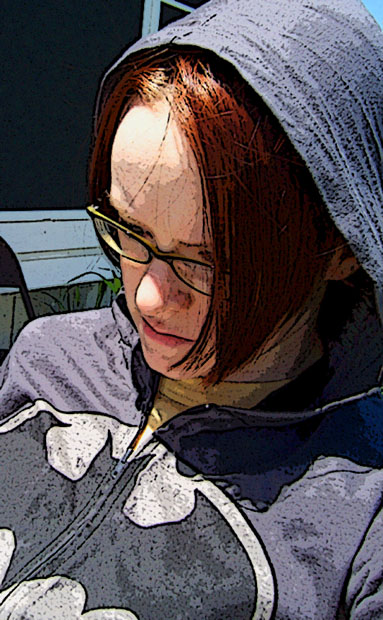5.22.2008
Facebook's Spring Cleaning
Good news for us Facebook lovers: they're cleaning it up in June, organizing all that stuff on our profiles into separate tabs for information, feeds, photos, etc. I for one will be ecstatic to see my profile page be a little less.... yeah. A little less, period. And I won't have to get rid of my iBook account to do it!
5.20.2008
Microcosm
I've always found it interesting that our docs department, like many, is essentially a microcosm of the library as a whole. We process, catalog, shelve, work a reference desk, etc. It used to be that one of the only functions we didn't perform was the digitization itself. Now we're doing that, as well, although just for one particular project.
A really awesome aspect of our library's Digital Projects Unit (DPU) is that they work on a lot of grant projects in any given year. It's great because, of course: important materials are digitized, our library/institution gain prestige, and it's one of the only parts of the library that is actively bringing in money. However, the nature of grant work means that the DPU's schedule of projects is quite different from any other library department. Grant work typically has a specific deadline and is also a profit-maker, both of which translate to getting a lot of work done in a short period of time. These bursts of productivity occur at various, often not predictable, periods during the year, meaning that DPU prefers to complete library projects in the quiet periods between grant projects, or for various brief spurts during those projects. This works well for the "slice and dice" projects of thick volumes (meaning simple metadata in small amounts) where we're either not preserving the original materials or we're having them rebound (in either case, the pages can be sliced from the original bindings and scanned by an automated process). Past projects of this type from GovDocs have been the FCC Record and the Experiment Station Reports.
However, some things either can't be sliced or, more often, they are very small pamphlet-type documents. These require more detailed metadata than a serial like the two projects above, as well as requiring more metadata per inch of documents (DPU calculates project based on inches of material, rather than pages).
In GovDocs, our problem fitting into this workflow for our A-Z project (cataloging and digitizing all pre-1960 documents) is two-fold. First, we hired a student primarily for this project, and it's hard to keep him on steady work when we've got complete metadata records waiting for scanned documents. Second, not knowing when DPU will have one of those "open" timeslots means that we end up keeping items off the shelf longer than our designated 30-day period. That's already caused a few issues with the Farmer's Bulletins, when patrons have requested them.
Our department's suggestion to resolve the issue for all parties was to have our student spent part of his time scanning the documents in the DPU. However, DPU doesn't have enough compuer workstations--but more than enough scanners, so they graciously sent one over to our student's station in Docs. So far, this seems to be an excellent solution--we can keep the workflow moving at our own pace, and our student can continue to work his regular schedule, without needing to be worked into the DPU rotation. And this way, DPU can concentrate on our "slice and dice" projects, which work better for them instead.
A really awesome aspect of our library's Digital Projects Unit (DPU) is that they work on a lot of grant projects in any given year. It's great because, of course: important materials are digitized, our library/institution gain prestige, and it's one of the only parts of the library that is actively bringing in money. However, the nature of grant work means that the DPU's schedule of projects is quite different from any other library department. Grant work typically has a specific deadline and is also a profit-maker, both of which translate to getting a lot of work done in a short period of time. These bursts of productivity occur at various, often not predictable, periods during the year, meaning that DPU prefers to complete library projects in the quiet periods between grant projects, or for various brief spurts during those projects. This works well for the "slice and dice" projects of thick volumes (meaning simple metadata in small amounts) where we're either not preserving the original materials or we're having them rebound (in either case, the pages can be sliced from the original bindings and scanned by an automated process). Past projects of this type from GovDocs have been the FCC Record and the Experiment Station Reports.
However, some things either can't be sliced or, more often, they are very small pamphlet-type documents. These require more detailed metadata than a serial like the two projects above, as well as requiring more metadata per inch of documents (DPU calculates project based on inches of material, rather than pages).
In GovDocs, our problem fitting into this workflow for our A-Z project (cataloging and digitizing all pre-1960 documents) is two-fold. First, we hired a student primarily for this project, and it's hard to keep him on steady work when we've got complete metadata records waiting for scanned documents. Second, not knowing when DPU will have one of those "open" timeslots means that we end up keeping items off the shelf longer than our designated 30-day period. That's already caused a few issues with the Farmer's Bulletins, when patrons have requested them.
Our department's suggestion to resolve the issue for all parties was to have our student spent part of his time scanning the documents in the DPU. However, DPU doesn't have enough compuer workstations--but more than enough scanners, so they graciously sent one over to our student's station in Docs. So far, this seems to be an excellent solution--we can keep the workflow moving at our own pace, and our student can continue to work his regular schedule, without needing to be worked into the DPU rotation. And this way, DPU can concentrate on our "slice and dice" projects, which work better for them instead.
5.14.2008
Snaps for UNT's CRS Reports Archive
I just had to mention that UNT is listed as the top website for CRS reports, according to this OhMyGov post by Andrew Einhorn.
Yay--and thanks, Andrew!!
Yay--and thanks, Andrew!!
5.01.2008
Free Comic Book Day 2008!

I first heard of this awesome experience while in the Star Wars Line in 2005. (Yes, believe it or not, I was geeky enough to sleep, eat, work, and do my homework in line at a theater for three weeks, but somehow wasn't geeky enough to know that there was a holiday where places gave out free comics. Go figure.)
In any case, this Saturday is the big FCB Day, coming to an independent comic store near you! Click on the image above to be taken to the website, which answers all your questions ("What... they're really free?" Yes, Viriginia), and also provides a handy comic-book store locator for those of you not already on a first-name basis with the Comic Book Guy from the Simpsons.
Er, does he actually have a first-name? (Oh indeed he does: Jeff. Why, thank you again Wikipedia, haven of pop culture trivia.)
But I digress... Go enjoy yourself some free comics, and if you don't read comics (the mind boggles), then get an issue or two for your geeky friends and/or patrons. While I was at TLA, I attended this great session on graphic novels with Gene Luen Yang, Tuan Nguyen, and Laura Jewell. One of the library-programming suggestions was to ask your local comics shop ahead of time if they'll donate their extra FCBD copies to you the day afterward. They'd made great giveaways for teen programs and such (I'm pondering using them next year to lure geeky college students through our doors).
Subscribe to:
Comments (Atom)


